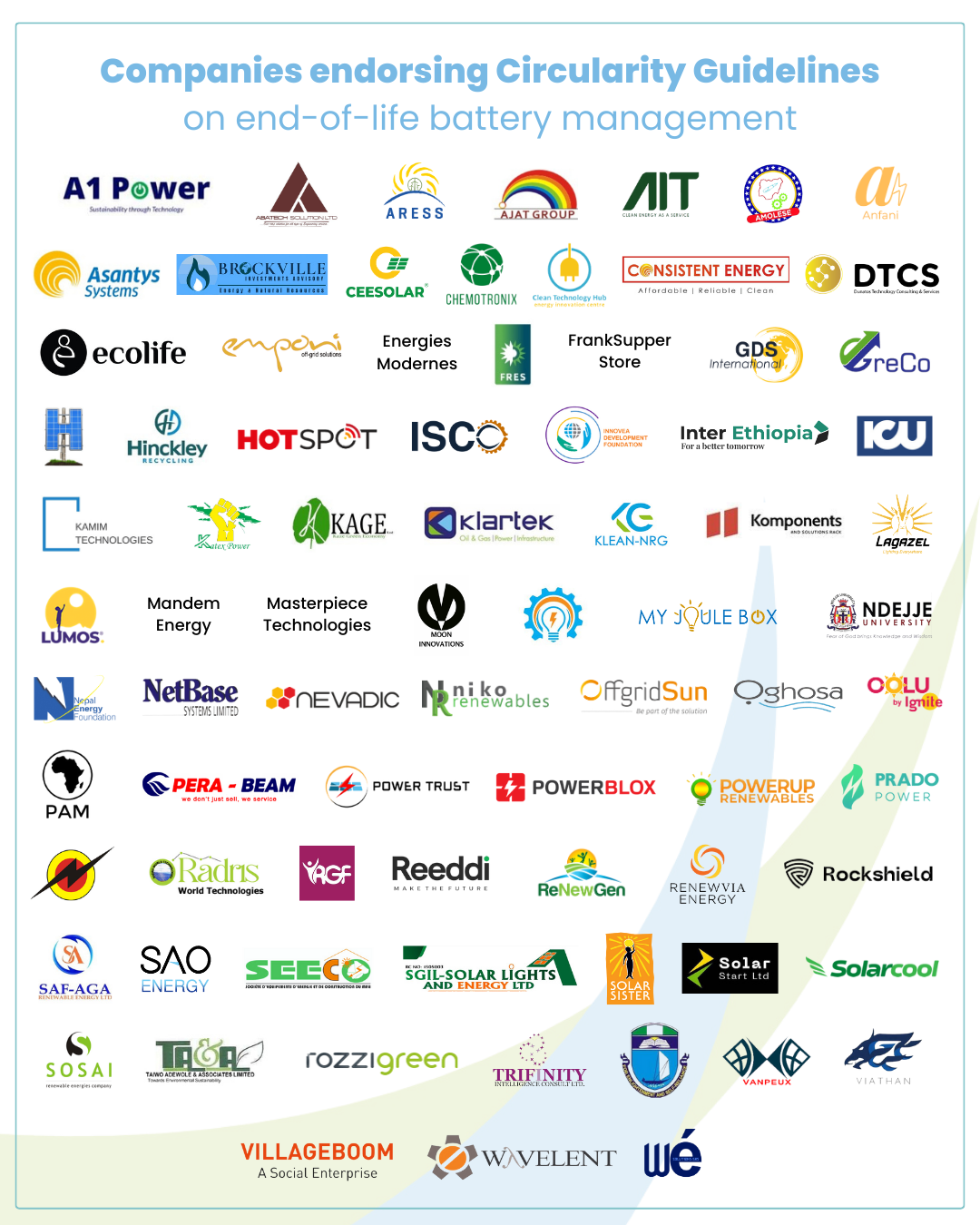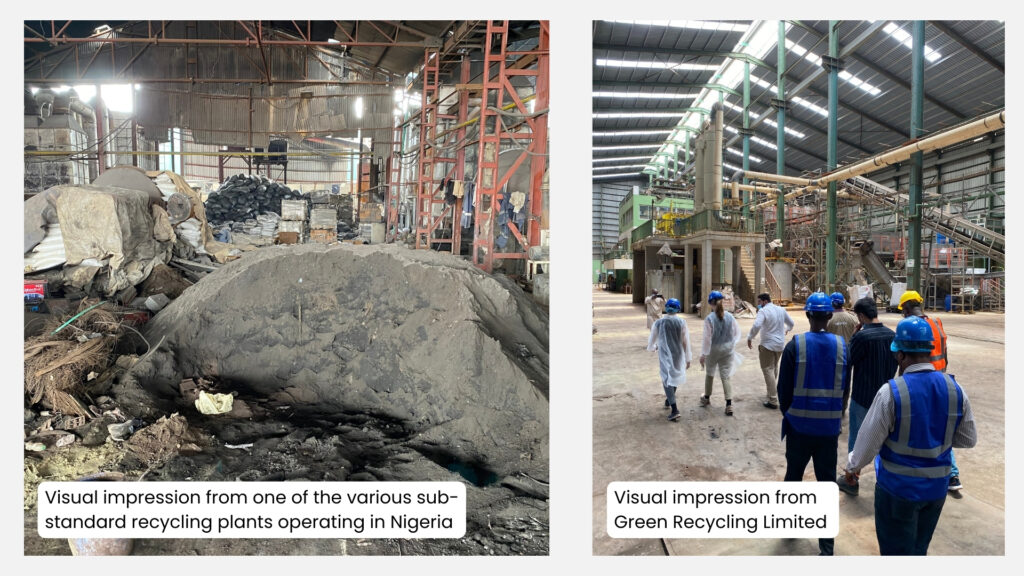Improving battery recycling in Nigeria, raising labour and environmental standards, and establishing sustainable trade flows for raw materials – these are the declared aims of the new project Partnership for Responsible Battery and Metal Recycling (ProBaMet). In this new project, partners from Nigerian civil society, the metal processing industry and the solar industry are working together with the Oeko-Institut to develop a cooperative approach to the responsible recycling of lead-acid batteries. To this end, the project is liaising closely with the Nigerian Federal Ministry of Environment and the environmental enforcement agency, Nigeria Standards and Regulations Enforcement Agency (NESREA).
In view of the serious health and environmental risks posed by unsound recycling practices, the project supports industrial companies and regulatory authorities in Nigeria in introducing environmental, health and safety standards. The project is funded by the Federal Ministry for Economic Cooperation and Development (BMZ) and supported by the Deutsche Gesellschaft für Internationale Zusammenarbeit (GIZ) GmbH.
Circularity Guidelines
The Alliance for Rural Electrification (ARE) has launched the Circularity Guidelines on end-of-life battery management, setting minimum standards in the renewable energy space in low- and middle-income countries and calling for renewable energy companies to endorse and embed these guidelines within their daily operations.

The list of companies endorsing the Circularity Guidelines: A1 Power Technologies, Abatech Solutions, African Renewable Energy Systems & Solutions (ARESS), Ajat Solar Systems, All in Trade, Amolese Multibiz Enterprises, Anfani, Asantys Systems GmbH, Brockville Investments Limited, Ceesolar Energy Limited, Chemotronix Limited, Clean Technology Hub, Consistent Energy, Dunatos Technology Consulting & Services Limited (DTCS), EcoLife, EMPO-NI Off-grid Solutions, Energies Modernes, Foundation Rural Energy Services (FRES), FrankSupper Store, GDS International, GreCo Power and Energy Ltd, Haske Energy, Hinckley, Hotspot Network, Industrial Solutions Company, Ltd., Innovea Development Foundation, Inter Ethiopia E-Waste Management, Istituto per la Cooperazione Universitaria, KAMIM Technologies LTD, KatexPower, Kaze Green Economy, Klartek Nigeria Ltd, Klean NRG Ltd, Komponents and Solutions, Lagazel, Lumos, MANDEM ENERGY, Masterpiece Technologies, Moon Innovations Limited, Moriental Technologies Limited, MyJouleBox, Ndejje University (Uganda), Nepal Energy Foundation, Netbase Systems Limited, Nevadic Limited, Niko Renewables, OffgridSun, OGHOSA, Oolu, PAM Africa, Perabeam, Power Trust Uganda, Power-Blox, Powerup Renewables Ltd, Prado Power, PSC Solar (UK), Radris World Technologies, Raising Gabdho Foundation (RGF), Reeddi Technologies Limited, RenewGen (Burundi), Renewvia Solar, Rockshield, Saf-Aga Renewable Energy Limited, SAO Energy, SEECO MALI, Sgil-Solar Lights and Energy Ltd, Solar Sister, SOLAR START LTD, Solarcool, Sosai Renewable Energies, Taiwo Adewole and Associates (TAA Limited), Tozzi Green Madagascar, Trifinity Intelligence Consult Ltd, University of Port Harcourt, Vanpeux Global Synergy Ltd, Viathan Engineering Limited, Villageboom, Wavelent Technologies Limited, WE SOLUTIONS-SAS.
An endorsement of these Guidelines signifies that the organisation aims to align internal practices with the Circularity Guidelines and commits to implement them in daily operations within two years of signing the endorsement. The guidelines may be endorsed by any renewable energy stakeholder that subscribes to the guidelines. This may, amongst others, include project developers, installers, manufacturers, investors, international funding partners and governments. For example, investors and international funding partners that endorse the Guidelines may request companies to fulfil the minimum standards of practice in their end-of-life lead-acid battery management when financing them. Should there be a need for support on the implementation of the Guidelines, the Alliance for Rural Electrification can connect you with relevant stakeholders.
More information & Endorsement
Modernising Nigeria’s recycling industry
Nigeria is home to one of the largest lead-acid battery recycling industries in Sub-Saharan Africa. At least ten facilities recycle batteries on an industrial scale, recovering raw materials such as lead, tin and antimony. These are mostly redeployed in battery production – either in Nigeria or abroad.
The aim of the joint project is to share experiences for the modernisation of the recycling sector in Nigeria. The partners are using a three-pronged approach: the Oeko-Institut and the industrial partners are providing knowledge on environmental protection and occupational safety for recycling plants and training plant managers to improve environmental performance and plant safety. In addition, the partners are developing concepts for how Nigerian regulatory authorities might introduce and monitor binding standards for environmental protection and occupational health and safety and implement them together with local companies. Last but not least, cooperation with other sectors is to be initiated, for example with the Nigerian solar industry, which requires environmentally sound solutions for used batteries. The German and international metals industry is as well highly interested in responsible supply chains for secondary raw materials.
Lead-acid battery recycling – risks and opportunities for the circular economy
Lead-acid batteries are used in cars, off-grid solar applications and backup power systems. Environmentally sound and safe recycling is possible and can effectively recover up to 97 percent of all contained raw materials. However, in many regions of the world, recycling takes place in substandard, highly dangerous and unsafe conditions, exposing workers and neighbouring communities to toxic lead dust.
This lead exposure can have serious health effects, including irreversible nerve and brain damage particularly in children. According to UNICEF, up to 800 million children, especially in low- and middle-income countries, have elevated blood lead levels. In addition to the dramatic impact on the lives of those affected, there is also long-term economic damage, which is estimated at four percent of the gross domestic product in Sub-Saharan Africa.
ProBaMet Project battery disposal guidance for Nigeria
In a significant step forward, ProBaMet together with regulatory agencies in Nigeria have assessed the lead-acid battery recycling landscape in Nigeria and came out with a positive listing for this country. To date, the positive list has only one entry – Green Recycling Ltd. – meaning that there is currently no other option for sound management of used lead-acid batteries in this country.

As battery recycling is a critical step that leads to a wide range of significant impacts on human health and the environment in case it is not conducted properly, companies involved in the renewable electrification sector in Nigeria are encouraged to use this listing as a benchmark for future lead-acid battery recycling initiatives.


